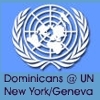

| BRIEFING - December 4, 2014 | To learn more about the Millenium Development Goals, click on the graphic Past Briefings: Nov 21, 2014 Oct 22, 2014 Oct 8, 2014 Sept 10, 2014 July 16, 2014 July 2, 2014 June 18, 2014 June 4, 2014 May 7, 2014 April 9, 2014 March 19, 2014 March 5, 2014 Feb 19, 2014 Jan 8, 2014 |
|
Working to prevent violence against women, minorities The International Day to End Violence Against Women was celebrated at the United Nations on Nov. 25. Each year, the 16 days following this event are designated as days of activism against gender violence. This year’s theme, “Orange Your Neighborhood,” was given vivid testimony as the Empire State Building was lit in orange in an effort to galvanize public awareness around this all-pervasive issue. Ms. Phumzile Mlambo-Ngcuka, Executive Director of UN Women, addressed those gathered, reminding us that “No country, no culture, no age group is untouched by this massive and pervasive human rights violation. Far too often, sexual and gender-based crimes go unpunished and the perpetrators walk free. Society turns a blind eye and a deaf ear.” A global pandemic Safe Cities Global Initiative Another kind of violence Of course it goes without saying that what happens here at home becomes world news. But perhaps not too many of us would be aware that what happens here at home is also scrutinized by the UN Committee Against Torture. In its first review of the United States’ record on preventing torture since 2006, the committee urged the U.S. to fully investigate and prosecute police brutality and shootings of unarmed black youth. The report, issued last week, also addressed the recent spate of “botched executions,” the frequent rape of inmates, shackling of pregnant women in prisons, and the extensive use of solitary confinement. While not making explicit mention of the events in Ferguson, the panel did refer to the “frequent and recurring police shootings or fatal pursuits of unarmed black individuals.” In light of all that disturbs us these days, and threatens to extinguish the spark of hope that lies deep within us, these words from Eleanor Roosevelt may serve as a reminder as to what is most important:
Hopefully, we are each up to the task at hand.
|
Dominican Leadership Conference
Building relationships and collaborating in the mission of preaching the Gospel
29000 West Eleven Mile Road
Farmington Hills MI 48336
248-536-3234 Contact: Executive Director
